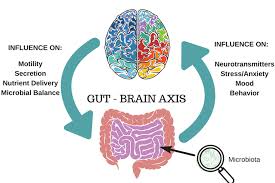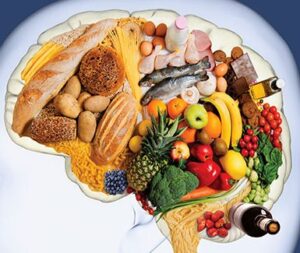The gut health is very important in our overall health and well-being. Recent studies have illustrated the importance of “gut health” in regard to brain health and the central nervous system.
“ALL diseases BEGIN in the GUT”- Hippocrates.


The “GUT “ defines health:
The “GUT “is what defines HEALTH. It is ground zero of our immune system. Only if the gut works in an optimal manner i.e. the way the food is digested and absorbed can we claim “You Are What You EAT”. Gut is so pivotal to our overall health- both physical and mental. Recent studies in scientific journals have illustrated the importance of “gut health” in regard to brain health and the central nervous system.
The Bidirectional gut brain axis wield power on our brain through multiple signaling mechanisms and it plays an important role in human brain diseases such as anxiety, depression, the way we feel pain, emotions, disorders of mood and even as a cause for Autism, Parkinson’s and Alzheimer’s.
95% of serotonin which is a neurotransmitter is made and stored in our gut. The signaling that happens between the Little Brain- the GUT and the Big Brain –can determine our energy levels, brain fog, fatigue, alertness and our cognition. So the food we eat has an effect on our day to day brain function and also can have a causative effect on allergies, autoimmune diseases such as Rheumatoid arthritis, and inflammatory diseases such as Crohn’s , Ulcerative colitis etc. just to name a few.
Overuse of different medications such as antibiotics, long term use of medicines for chronic diseases such as diabetes, obesity alter the beneficial microbes in the gut and cause an imbalance which in scientific terms is called as “ dysbiosis”.
Important nutrients for brain health:


2. Flavonoids: Cocoa, green tea, citrus fruits, dark chocolate, red wine, purple grapes, Jamun has found to improve cognition in the elderly and also improve learning and memory in ischemic stroke patients.
3. B Vitamins: Pyridoxine (B6), Folate (B12) has positive effects on memory and performance and is found in oats, wheat germ, brown rice, eggs, certain veggies , soya beans.
4. Vitamin D: Preserves cognition in the elderly and is found in fatty fish, mushrooms, fortified milk, and soya milk and cereal grains.
5. Vitamin A, C & E: These are antioxidant vitamins and are found in red and orange colored vegetables and fruits, good fats such as olive oil, sesame oil and coconut oil, and citrus fruits such as oranges, lemons and amla which is the Indian gooseberry.
6. Calcium, Zinc and Selenium: Found in Nuts, cereals, meat, fish and eggs, milk and milk products like curd, panneer buttermilk, plants and vegetables help immensely in cognitive function.
7. Copper: Which is found in liver of lamb, nuts, cocoa, black pepper helps in spatial processing, learning navigation and long term memory.
8. Iron: Found in red meat, jaggery, dates, certain pulses helps in cognitive function.


Healthy gut regulates the brain functions and emotions and hence “MINDFUL” eating loaded with good nutrients and avoiding junk foods saturated with sugar, trans fats, and empty calories will have an impact on our daily life. So every single food we eat and drink has a good or bad effect on our overall health and also on our brain health. World Microbiome Day is celebrated on June 27th every year.
“HEAL your Microbiome and the Microbiome will HEAL you”


Sreemathy Venkatraman
Clinical Nutritionist
BRAINS Hospital,Bengaluru











